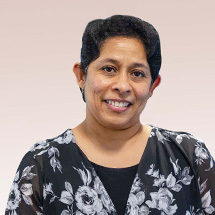Cancer cells are not only stubborn; they are smart. They find ways to continue to grow and multiply by mutating to evade the immune system and anti-cancer therapies. The slyest cancer cells continue to mutate over time. Lata Jayaraman knows this all too well.
“The cells go into survival mode, they know they are dying and the stress of that desire to survive causes mutations,” Jayaraman explains. “Kind of like a teenager who doesn’t listen to his parents’ advice, mutations mean that the tumor cell doesn’t listen to cues that tell it to stop proliferating, and instead finds ways to resist the therapy and continue to divide. That is the process of development of resistance.”
In Cambridge’s Kendall Square, Jayaraman is head of Oncology Drug Discovery at Bristol Myers Squibb’s state-of-the-art Mechanisms of Cancer Resistance (MoCR) Thematic Research Center (TRC), where she and her team of researchers are working to change the game for people with cancer whose tumors do not respond to current therapies. They seek to discover and enable development of new treatment options targeting pathways that cancer cells often rely on in order to escape current standard-of-care treatments.
Methods for overcoming cancer drug resistance
Jayaraman and her team specialize in discovering and optimizing drugs for novel targets that have the potential to overcome cancer resistance mechanisms. Through years of research and an interdisciplinary approach, they have learned some methods for combatting those sly cancer cells. She says the trick is to attack these cells with multiple weapons (i.e. drug combinations) at the same time.
In some cases, mutations can be silent (a change in a DNA sequence that does not change the basic building blocks of a gene) or be acquired over time, which explains why some patients may respond well to certain therapeutics for several years before the cancer develops resistance mechanisms. And then just like that, a therapy that once worked can become ineffective.
In the lab, Jayaraman and her colleagues are trying to figure out how to make it impossible for a tumor cell to survive, utilizing a concept called synthetic lethality. Synthetic lethality occurs when mutations in two genes together result in cell death, but a mutation in just one of the genes would not. “Using next generation therapies, you attack the vulnerability of the cancer cell,” she said. “Through clever experiments in the lab and collaborating with colleagues in the other TRCs and functional areas, we hope to identify combinations of drugs that will knock the tumor cell out.”



